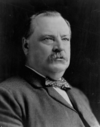1892 Democratic National Convention
|
1892 presidential election |
|
 
Nominees
Cleveland and Stevenson |
|
| Convention | |
|---|---|
| Date(s) | June 21–23, 1892 |
| City | Chicago, Illinois |
| Venue | The Wigwam |
| Candidates | |
| Presidential nominee | Grover Cleveland of New York |
| Vice Presidential nominee | Adlai E. Stevenson of Illinois |
The 1892 Democratic National Convention was held in Chicago, Illinois, June 21–June 23, 1892 and nominated former President Grover Cleveland, who had been the party's standard-bearer in 1884 and 1888. This marked the first time a former president was renominated by a major party. Adlai E. Stevenson of Illinois was nominated for Vice President. The ticket was victorious in the general election, defeating the Republican nominees, President Benjamin Harrison and his running-mate Whitelaw Reid.
Former President Grover Cleveland of New York
Senator David B. Hill of New York
By the end of Harrison's term, many Americans were ready to return to Cleveland's harder policies. As Democrats convened in Chicago, Illinois on June 8–June 11, 1892, Cleveland was the frontrunner for the nomination, but faced formidable opposition. He had come out against the free coinage of silver, thereby earning the enmity of Western and Southern Democrats. Most damaging of all was the opposition of his home state; the New York delegation, packed with Tammany men, frequently demonstrated their hostility to Cleveland's candidacy on the convention floor. However, Cleveland's cause was aided by his position on the tariff, his perceived electability, a strong organization, and the weakness of his rivals' candidacies.
In a narrow first-ballot victory, Cleveland received 617.33 votes, barely 10 more than needed, to 114 for Senator David B. Hill of New York, the candidate of Tammany Hall, 103 for Governor Horace Boies of Iowa, a populist and former Republican, and the rest scattered.
...
Wikipedia
